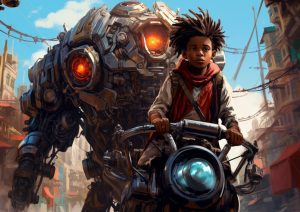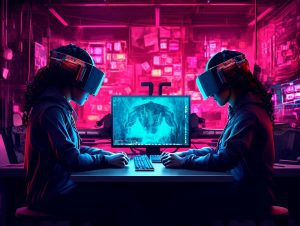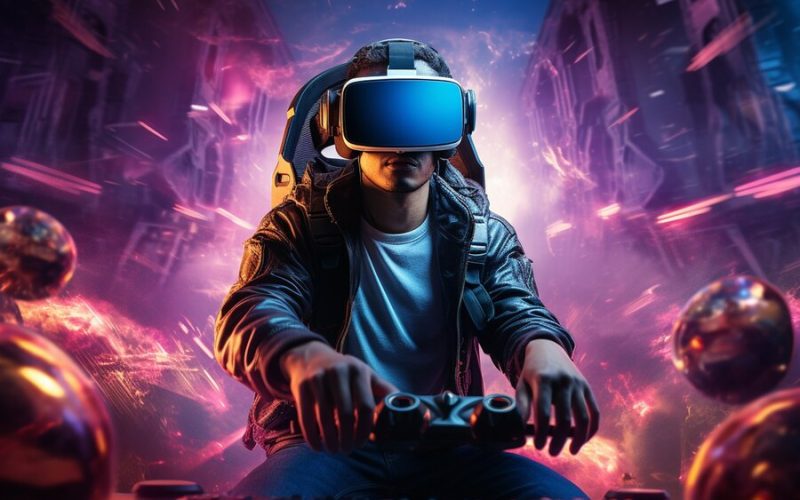Introduction
In recent years, the lines between video games and Hollywood blockbusters have blurred significantly. The once distinct realms of interactive gaming and cinematic storytelling are now interwoven, creating a dynamic synergy that enriches both industries. This article delves into how video games are influencing Hollywood, shaping the way movies are made, marketed, and consumed.
The Evolution of Video Games and Hollywood

-
Historical Context
The relationship between video games and Hollywood has evolved dramatically since the early days of both industries. Initially, video games were simple, pixelated experiences, while Hollywood focused on grand, narrative-driven films. However, as technology advanced, so did the complexity and depth of video games, paving the way for a more profound connection between the two.
-
Technological Advancements
The advent of sophisticated graphics, motion capture, and immersive storytelling in video games has had a significant impact on Hollywood. These technological advancements have not only improved the quality of video games but have also set new standards for visual effects and storytelling in films.
The Rise of Video Game-Inspired Action Sequences
One of the clearest ways video games have influenced Hollywood is through the action sequences in films. Video games are known for their fast-paced, immersive combat scenes, often requiring quick reflexes and strategic thinking. Hollywood has borrowed from this, creating visually dynamic action scenes that mimic the intensity of a video game. Movies like John Wick and Mad Max: Fury Road showcase video game-style combat, where action is fluid, continuous, and sometimes even feels like the viewer is controlling the character.
Game Characters Bringing Depth to Movie Heroes
Video games often offer complex, multi-dimensional characters that evolve as players progress through a story. Hollywood has begun adopting this approach, moving away from one-dimensional protagonists to more layered and dynamic heroes. Films like The Witcher and Tomb Raider take inspiration from video game characters, showing heroes with intricate backstories, flaws, and personal growth, which help create a more immersive experience for audiences.
Narrative Techniques

-
Storytelling in Video Games
Video games have become a powerful medium for storytelling, often featuring complex narratives, character development, and emotional depth. This has influenced Hollywood filmmakers to adopt similar techniques in their movies. Games like The Last of Us and Red Dead Redemption have demonstrated that video games can tell stories that are just as compelling, if not more so, than traditional films.
-
Non-Linear Narratives
One of the most significant influences of video games on Hollywood is the adoption of non-linear narratives. Unlike traditional films, video games often allow players to make choices that affect the outcome of the story. This interactive storytelling model has inspired filmmakers to experiment with non-linear narratives, giving audiences a more engaging and immersive experience.
Cinematic Storytelling in Video Games
While video games influence Hollywood, the reverse is also true. Many video games now mimic the visual style and storytelling of Hollywood films. Games such as The Last of Us and Red Dead Redemption 2 use cinematic cutscenes, intricate storylines, and character development that rival major film productions. This mutual influence has elevated both industries, blurring the lines between film and gaming narratives.
The Role of Virtual Reality (VR) in Cinema
Virtual reality technology, once primarily used in video games, is making its way into Hollywood. VR allows audiences to immerse themselves completely in a film’s world, offering a 360-degree viewing experience. This technology, first developed for gaming, is being used to create unique cinematic experiences where viewers can explore movie environments as if they are inside the story. VR short films and experiences, such as The Lion King VR Experience, show the potential for VR to reshape Hollywood’s future.
Visual Effects and Cinematography

-
Motion Capture Technology
Motion capture technology, widely used in video games, has revolutionized the way Hollywood creates realistic and dynamic characters. Films like Avatar and The Lion King have utilized this technology to bring characters to life in ways that were previously unimaginable.
-
Real-Time Rendering
Real-time rendering, a technique perfected in video games, is now being used in Hollywood to create stunning visual effects. This technology allows filmmakers to see the final product in real-time, making the production process more efficient and cost-effective.
Expanding Merchandise and Branding Opportunities
The collaboration between video games and Hollywood also extends to merchandise and branding. Video game-inspired films and characters offer a wide range of branding opportunities, from toys and clothing to in-game purchases. This cross-industry partnership has created new ways for companies to monetize popular franchises. Successful brands like Fortnite and Marvel have capitalized on the blending of game and movie content, strengthening both industries’ revenue streams.
Collaborations Between Game Developers and Filmmakers
With the rise of video games influencing blockbusters, collaborations between game developers and filmmakers have become more common. Studios are now working directly with game creators to ensure that adaptations stay true to the source material and appeal to fans of the games. These partnerships have led to more authentic adaptations, as seen with The Witcher and Uncharted, which have been praised for their faithfulness to the original games.
Character Development

-
Complex Characters
Video games often feature multi-dimensional characters with intricate backstories and motivations. This has influenced Hollywood to create more complex and relatable characters in their films. The depth of character development seen in games like Mass Effect and The Witcher has set a new standard for character-driven storytelling in movies.
-
Emotional Engagement
The interactive nature of video games fosters a deep emotional connection between players and characters. Hollywood has taken note of this and is now focusing on creating emotionally engaging characters that resonate with audiences on a deeper level.
Bridging the Gap Between Passive and Interactive Viewing
As video games push audiences toward more interactive experiences, Hollywood is exploring ways to make films more participatory. Projects like Black Mirror: Bandersnatch allow viewers to make choices that impact the storyline, a concept borrowed from video games. This experimentation marks a shift in how movies are consumed, as filmmakers look to combine the passive nature of film with the interactive engagement of video games.
Future Trends: The Continued Fusion of Games and Cinema
The trend of video games influencing Hollywood blockbusters is expected to continue growing. As technology advances and audiences demand more interactive experiences, the line between the two mediums will blur even further. With more films inspired by game mechanics, visual styles, and storytelling structures, Hollywood and the gaming industry are set to become even more interconnected, creating richer and more immersive entertainment experiences for global audiences.
Marketing and Audience Engagement

-
Cross-Promotion
The symbiotic relationship between video games and Hollywood is also evident in their marketing strategies. Cross-promotion between films and video games has become a common practice, with movies often releasing companion games and vice versa. This not only boosts the visibility of both products but also creates a more immersive experience for fans.
-
Fan Engagement
Video games have a dedicated and passionate fan base, and Hollywood has tapped into this by engaging with fans through social media, forums, and other platforms. This direct interaction with fans helps filmmakers understand their audience better and create content that resonates with them.
Case Studies

-
The Witcher Series
Originally a series of novels, The Witcher gained global recognition through its video game adaptations. The success of the games led to the creation of a Netflix series that has been well-received by both fans and critics. This is a prime example of how video games are influencing Hollywood by providing rich source material for adaptations.
-
Ready Player One
Steven Spielberg’s Ready Player One is a film that directly draws inspiration from video game culture. The movie is filled with references to classic games and features a virtual reality world that mirrors the immersive experiences found in modern video games.
Comparative Table: Video Games vs. Hollywood Films
| Aspect | Video Games | Hollywood Blockbusters |
| Narrative Style | Nonlinear, interactive, player-driven | Linear, director-driven |
| Character Development | Deep, with player input | Scripted, less player input |
| Visual Aesthetics | Real-time rendering, 3D environments | VFX-heavy, often pre-rendered |
| Audience Interaction | Active participation in story | Passive viewing experience |
| Revenue Model | In-game purchases, DLCs, and full-game sales | Box office, streaming platforms |
| Marketing Synergy | Game tie-ins, trailers in-game | Movie premieres, merchandise |
Analysis Table: Influence of Video Games on Hollywood Blockbusters
| Key Influence | Impact on Hollywood | Examples |
| Storytelling Techniques | Encouraged non-linear and branching narratives | Black Mirror: Bandersnatch |
| Visual Aesthetics | Pushed for greater realism and real-time rendering | The Mandalorian, Ready Player One |
| Character Development | Focus on complex characters and detailed backstories | Tomb Raider, Detective Pikachu |
| Marketing Strategies | Cross-promotion of games and movies, increased transmedia storytelling | Marvel’s Avengers, Star Wars Battlefront |
| Interactive Elements | Gamification of films, audience participation in plot decisions | Black Mirror: Bandersnatch, post-credit scenes in Marvel films |
Conclusion
The influence of video games on Hollywood blockbusters is undeniable. From narrative techniques and visual effects to character development and marketing strategies, video games have left an indelible mark on the film industry. As technology continues to advance, the relationship between these two entertainment giants will only grow stronger, leading to even more innovative and immersive experiences for audiences worldwide.
By understanding and embracing the ways video games influence Hollywood, filmmakers can create richer, more engaging stories that resonate with modern audiences, ensuring the continued evolution and success of both industries.












